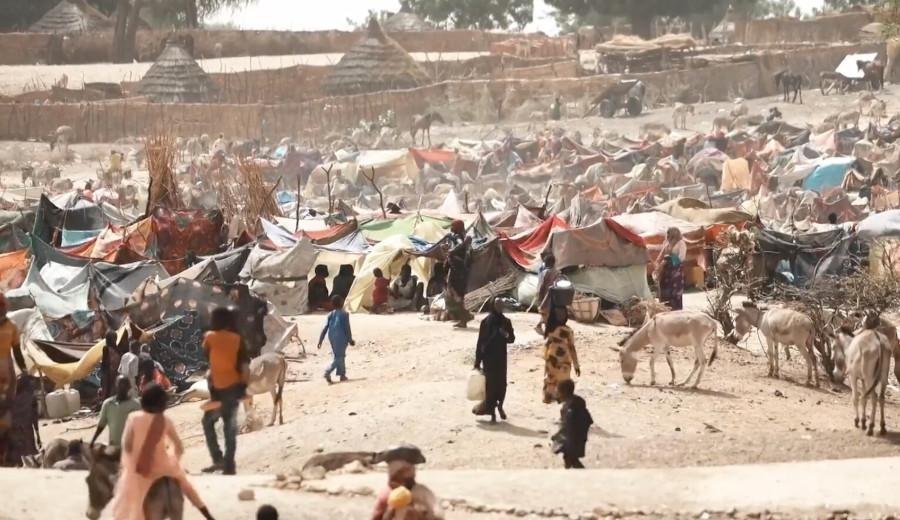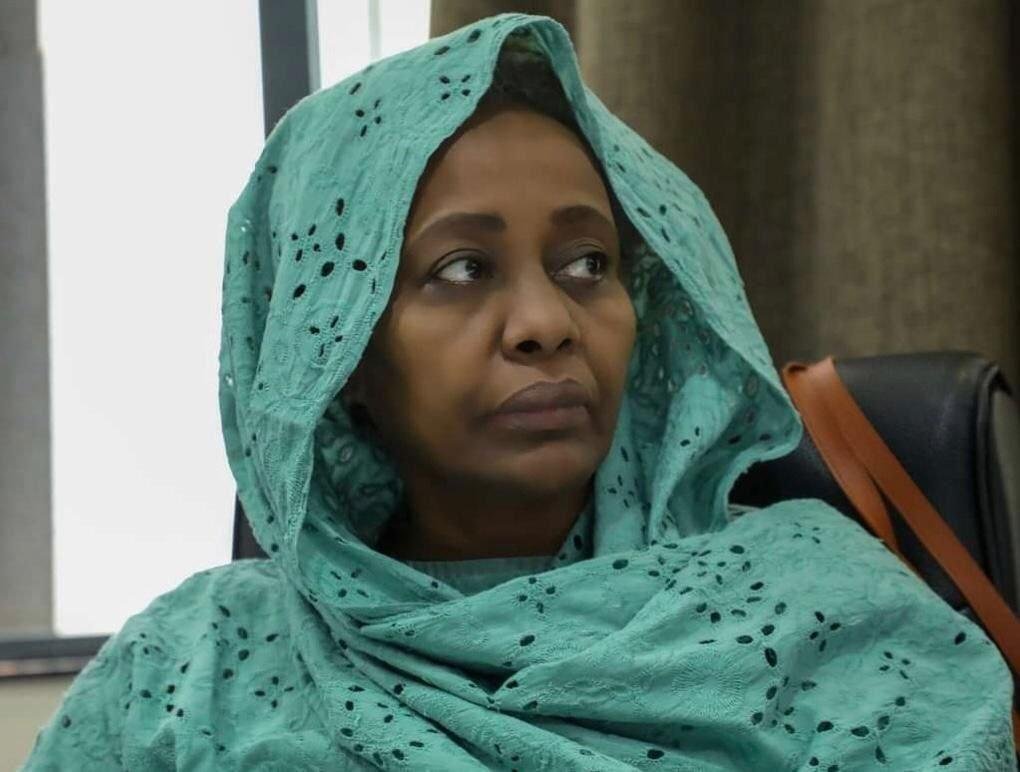“Just let us live”: Sudan’s war and women’s vital role in peacebuilding

Story by Leila Hawkins
Photo: Refugees who fled Sudan for a camp in Chad / Henry Wilkins / VOA / Creative licence

In 2019, the streets of Sudan’s major cities pulsated with the beat of a revolution—Omar al-Bashir’s 30-year dictatorship was coming to an end. The efforts of young people and women had been central to the regime change; images like that of 22-year-old student turned activist Alaa Salah standing atop a car and chanting in front of demonstrators made headlines around the world, a hopeful symbol of resistance and of a possible future where people had risen against the autocracy against all the odds, and won.
It was not to last. Since April 2023 Sudan has been engulfed in a war that has devastated the entire country, caused widespread famine and extreme poverty, and where women’s bodies have become the targets as sexual violence is routinely used as a weapon of war. It is a terrible indictment of what can go wrong when power is left in the wrong hands, and interference from surrounding countries with vested interests is allowed to wreak havoc.
The ravages of Sudan’s civil war
All of Sudan’s 18 states are currently immersed in civil war. The conflict is mostly centred on violence between Sudan’s Armed Forces (SAF), the official military and main force that supported Bashir’s regime, and the paramilitary Rapid Support Forces (RSF), originally created as a counter-insurgency force to help suppress rebel movements.
The RSF was a key player in toppling Bashir from power, after which it formed part of the transitional government along with the SAF. Tensions soon arose between the two over issues like who would gain overall control of Sudan’s political future. In 2023 these tensions erupted into the war, killing 15,000 people to date, and displacing more than 8.2 million. The UN has called it the worst displacement crisis in the world.
“With the war, no one is going to work and no one is being paid,” explains Dr Rabab Baldo. Baldo is a member of FemWise-Africa and PeaceWomen Across the Globe’s network Feminists Connecting for Peace, who has played a prominent role in Sudan’s peacemaking efforts since the 1990s. “Resources are drying out,” she adds. “Even those who had savings have drawn these out over the last 18 months.”
The banking sector has all but collapsed, and the internet can go down for weeks at a time. The cost of internet access is also prohibitively expensive for many, and without it it’s difficult for people to receive financial support.

Access to life-saving medicines is a challenge, and is particularly acute for those who have chronic diseases and the elderly, because of the multiple checkpoints these have to pass through. “All the resources you have will be taken by soldiers from both sides, be it from Sudan Army Forces or the RSF. They take everything from you, including medicine, money and mobiles,” Baldo says.
Meanwhile there are signs that famine is spreading due to a lack of water and electricity and the collapse of food supply chains; it is especially acute in Darfur and central areas like Kordofan, where people have lost all means of making a living.
The causes of war: Sudan’s goldmine and political interference
Sudan’s position, in a prime strategic location in the Horn of Africa, bordering the Red Sea to the east, offers surrounding countries a gateway to central Africa. Baldo says that interference from neighbouring countries impacts the internal dynamics of Sudan because they affiliate themselves to military and political actors for their own interest.
Sudan is one of the world’s biggest producers of gold, yet little of this is supporting the national economy as it remains one of the poorest places to live on earth. While estimates point to the annual production of around 109 tons of the precious material, it is believed that large quantities are being smuggled to Russia, helping to prop up its heavily sanctioned economy in exchange for supporting and training the RSF.
There is also a large amount of arable land, which appeals to neighbouring Gulf states that are largely desert. “Gulf countries want this to be their backyard farm to provide them with food,” Baldo says.
Bashir’s regime played its part, Baldo says, as “he reached out to militias in West Africa and encouraged them to come to Sudan for his own protection. He really invested a lot of resources and money in this.” His agenda was “to divide the country and create war pockets, supporting different militias in neighbouring countries.” This included the war in Yemen, which offered Sudan’s foot soldiers far higher wages than they could earn at home. Bashir brokered a deal that saw thousands of men sent to Yemen, which many believe strengthened the capacity of the RSF. “Sudan was known to have very strong foot soldiers, but when the war started we lost them,” Baldo says. “This created an imbalance in terms of military on the ground, which was then forced to use air strikes to control the movement of the RSF.”
I question European countries that say they have strong feminist foreign policies, and at the same time are selling weapons and empowering militias to intervene
“We should also not forget the role of the European Union when they supported the RSF with high tech equipment and training to help control the ‘illegal migrants’ in the desert,” Baldo adds. “That project built the capacity of the RSF to be strong fighters, with very strong communication capabilities.
“I always question European countries when they say they have strong feminist foreign policies, and at the same time are selling weapons and empowering militias to intervene.”
“The manpower and logistical support from other countries has made the suffering of Sudanese people continue for a second year,” Baldo says. “Women are disappearing, are being enslaved, and are systematically raped and killed, especially those who are activists and are involved in communal kitchens and emergency response rooms to provide very basic support to their families and communities.”
Women in Sudan: Leading the revolution, targeted by war
Women in Sudan are seven times more likely than men to live in extreme poverty, according to a recent UN report. Day-to-day life for young girls is dire, with reports pointing to a rise in child marriage that is forcing some girls to be married to three or four men at the same time.
Alarmingly, women appear to be direct targets in the war, with sexual violence deployed widely as part of its machinery. “Since it started, the war has been fought on the bodies of women,” Baldo says. “Rape in RSF areas has become a trend. We have the reports from fact-finding missions, as well as reports from women on the ground who are providing psychosocial and trauma healing for survivors of sexual and gender-based violence… Two-year-old children and 80-year-old women have been raped. Women have been taken to different areas from the capital Khartoum and from Darfur, to be enslaved for sexual purposes.”
To understand why women are being targeted this way, it’s important to know the role they played leading up to the 2019 uprising. More than 10 years earlier, the Public Order Act was introduced giving the police extensive powers to punish women over the way they behaved and dressed (including administering lashings for wearing trousers in public.) This spurred women to mobilise as far back as 2013.
“We started to organise ourselves and come up with a plan to change the regime. There was a collective effort from Sudanese people, especially women, inside the country, in the diaspora and internally displaced people (IDP) camps to come together. Student voices were very loud. We were well organised. We had a vision for change, and we managed to bring about the change despite the fact that we didn’t have support from neighbouring countries until the narrative was written on the wall when the regime was thrown out, and then people started running to support the revolution.”
“In neighbouring African countries that have a dictatorship, they saw women and young people leading the revolution,” Baldo continues. “They didn’t want such a democracy to be a model for the region and to inspire others. So the plan started to fail. The National Congress Party (the NCP, Bashir’s political party) was still in power. They have shadow militias that they can mobilise anytime and they wanted revenge, so they planned the Khartoum massacre that happened in June 2019.”
The attack saw both the RSF and the SAF collude to use heavy gunfire and tear gas on pro-democracy protestors in the capital. At least 120 people were killed, with many more arrested and disappeared, families terrorised in their homes across the country, and hospitals reporting the rape of more than 70 women and men. It was a scare tactic, Baldo says, but while for many this was a sign of the civil war to come she says the attack did not achieve its objective. “It empowered us to be stronger and more committed for those who lost their lives, to ensure that the objective of our revolution would be achieved.”
The mistake, she says, was leaving the military forces to rule during those first months of democracy before enabling a transition to civilians. “It gave them the opportunity to continue their plan to systematically target the revolutionary forces and create division among them, and they succeeded, to some extent.” Yet Baldo emphasises that among activists, the mission to bring democratic and civilian-led change to Sudan continues.
Women and the peace process
The role of women in peacemaking efforts seems obvious given the levels of violence directed at them, but Baldo says there is more to it than simply addressing these harms. She cites the examples of localised ceasefires, like the agreement for the warring factions to leave their weapons outside a market so people could get food to feed their families, and the six-month ceasefire to allow people to engage in certain agricultural activities to have a means to live. “This was not on their mind [before]. Women bring that kind of software to the hardware of the ceasefire talks,” she says.
They also play a vital role in steering young men, tribal leaders and religious leaders away from the military and towards peaceful solutions. “Despite coming from conflicting tribes, they have been working together to maintain community cohesion, through the communal kitchens, for example. Women in general bring additional value to the peace process, not only because they are victims of the war, but because they are active in bringing an end to it. We must not ignore this. Even at our consultation in Geneva, the mediation team recognised the value of our involvement as women.”
In August this year Baldo travelled to Geneva along with a number of other Sudanese women activists to propose a peace agreement based on the UN’s resolution on women, peace and security. The aim was to engage both warring parties, but unfortunately representatives for the Sudan Armed Forces did not show up. “We refuse to engage with just one party,” Rabab says. “We wanted to have the two parties together so we can send our messages collectively.”
“The war cannot continue because of people’s suffering. They have to listen to the call from Sudanese people to end this bloody war. It’s high time to use diplomatic muscle on the countries that have real influence on the two parties, to stop the war, to stop the logistical support, to stop the media covering for them. If there was real interest from the international community to influence those countries fueling the war, the war would stop today. Unfortunately, those countries that are interfering in the region are also influential in international politics, so no one is directly addressing their interference in Sudanese issues.”
Her message to the international community is clear: “Sudan is at war because of international interference. Allow us to clean up the environment war has created, to rebuild our schools, to rebuild our hospitals, our markets, our houses, and our public services so that people can come back to Sudan. Sudan is for us, it is not for others to kill us and take our resources. Just allow us to live.”

READ MORE
